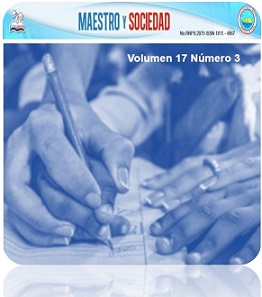Learn to teach: a path for the architect-teacher
Array
Keywords:
teaching architect, learning to teachAbstract
In Peru, it is often considered that to teach in the design workshop of some architecture faculty, it is enough to be an architect, hence having some formation in pedagogy is not considered essential. Most teachers start casually, it is considered sufficient to have the will to teach, have knowledge of architecture, and to replicate, with some variations, the way in which they were trained during their career years. The teaching model in the design workshop has not undergone major changes over the decades, it is learned in an empirical and intuitive way, focusing on practice. However, the needs and demands of today's society require new strategies to achieve adequate responses. It is necessary to incorporate pedagogical criteria that allow comprehensive training corresponding to current requirements. The current legal framework for higher education has initiated necessary changes in this regard. What remains is for teachers-architects and universities to internalize the spirit of the law, not just the text, and to build new approaches to what higher education in architecture refers to.
References
2. Alba, M. I. (2016). La enseñanza de la Arquitectura. Iniciación al aprendizaje del proyecto arquitectónico. Revista Española De Pedagogía, 74(265), 445-460. Recuperado de https://www.jstor.org/stable/24751185
3. Benavides, M., León, J., Haag, F. y Cueva, S. (2015). Expansión y diversificación de la educación superior universitaria, y su relación con la desigualdad y la segregación. Documentos de Investigación 78. Educación y aprendizajes. Grade. Recuperado de https://www.grade.org.pe/wp-content/uploads/ddt78.pdf
4. Correal, G. D. y Verdugo, H. (2011). Sobre modelos pedagógicos y el aprendizaje del proyecto arquitectónico. Revista de Arquitectura, 13, 80-91. Recuperado de https://www.redalyc.org/articulo.oa?id=125121298010
5. Del Mastro, C. (2016). Coordenadas para la Formación del Docente Universitario. En Blanco Y Negro, 7 (2), 15-27.
6. Delors, J. (1996). Los cuatro pilares de la educación. En La educación encierra un tesoro. Informe a la Unesco de la Comisión internacional sobre la educación para el siglo XXI. Madrid: Santillana/Unesco, 91-103. Recuperado de http://www.unesco.org/education/pdf/DELORS_S.PDF
7. Deroncele A., A., Medina Z., P., y Gross T., R. (2020). Gestión de potencialidades formativas en la persona: reflexión epistémica y pautas metodológicas. Universidad y Sociedad, 12(1), 97-104. Recuperado de https://rus.ucf.edu.cu/index.php/rus/article/view/1417
8. Deroncele, A., Suárez, C. y Del Toro, M. (2013). Formación profesional integral del psicólogo en el contexto organizacional: Un análisis histórico tendencial. Revista Santiago, 10(131), 436-455. Recuperado de https://santiago.uo.edu.cu/index.php/stgo/article/view/95
9. Dreifuss-Serrano, C. (2015). Enseñanza-aprendizaje en el taller de diseño. Limaq Revista de Arquitectura de la Universidad de Lima, 1, 67-92. Recuperado de https://revistas.ulima.edu.pe/index.php/Limaq/article/view/354/337
10. Glaser, E. (2015). Compliant captives in a paper cage. Times Higher Education, 2(204), 42-45 Recuperado de https://www.timeshighereducation.com/sites/default/files/the210515.pdf
11. Gross, R., Montoya, J., y Deroncele, A. (2017). Estrategia educativa para la formación científico-profesional del estudiante de psicología: resultados de su aplicación parcial. Revista Opuntia Brava, 9(1), 291-304. Recuperado de http://200.14.53.83/index.php/opuntiabrava/article/view/142
12. Ledo, C., y Deroncele, A. (2017). El diplomado de Educación Superior para jóvenes docentes y su impacto en los procesos universitarios. Revista Didasc@lia: Didáctica y Educación, 8(7), 1-10. Recuperado de https://refcale.uleam.edu.ec/index.php/didascalia/article/view/1833
13. Ley Nº 30220 Nueva Ley Universitaria. (2014). En Diario Oficial El Peruano, Lima, Perú, 9 de julio de 2014.
14. Medina-Zuta, P., & Deroncele-Acosta, A. (2019). La evaluación formativa desde el rol del docente reflexivo. Maestro y Sociedad, 16(3), 597-610.
15. Proyecto Educativo Nacional al 2021. La educación que queremos para el Perú (2007). Recuperado de http://www.minedu.gob.pe/DeInteres/xtras/PEN-2021.pdf
16. Sunedu. (2018). Informe Bienal Sobre la Realidad Universitaria Peruana. Recuperado de https://www.sunedu.gob.pe/informe-bienal-sobre-realidad-universitaria/
17. Vélez, S. (Ed.). (2013). Proyecto Tuning América Latina. Educación Superior en América Latina: reflexiones y perspectivas en Arquitectura. Recuperado de: http://tuningacademy.org/wp-content/uploads/2014/02/RefArchitecture_LA_SP.pdf
Published
How to Cite
Issue
Section
License
This journal provides immediate open access to its content, based on the principle that offering the public free access to research helps a greater global exchange of knowledge. Each author is responsible for the content of each of their articles.



























 Universidad de Oriente
Universidad de Oriente 